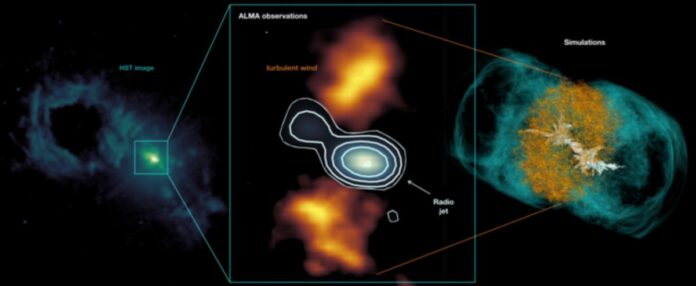New research investigates how relativistic jets from a supermassive black hole has been shaping the Teacup Galaxy, giving it its iconic handle.
Active galactic nuclei (AGN) are some of the most intense places in the universe, where supermassive black holes are gobbling up matter and spewing out jets that move at almost the speed of light. Astrophysicists know that these relativistic jets shape the galaxies they’re in, stirring up and pushing out material as they shoot out from the central black hole.
But not all jets are created equal — some are stronger and drastically change their surroundings by heating up the gas in their galaxies, stunting the galaxy’s growth. Others are weaker, referred to as radio-quiet, but computer simulations suggest they still have shockingly large effects and an ability to push around nearby gas.
Related: Black holes of the universe (images)
“It was previously believed that low-power jets had a negligible impact on the galaxy,” Christina Raos Almeida, an astronomer at the Instituto de Astrofísica de Canarias (IAC) and co-author of the new study (opens in new tab), which was published online Tuesday (March 21) in the journal Astronomy & Astrophysics, said in a press release.
The team’s new observations from the Atacama Large Millimeter Array (ALMA) show, however, that at least in the Teacup — a radio-quiet galaxy named for its appearance that lies about 1.3 billion light-years from Earth — jets are moving, heating and accelerating the galaxy’s gas.
“Even in the case of radio-quiet galaxies, jets can redistribute and disrupt the surrounding gas, and this will have an impact on the galaxy’s ability to form new stars,” Almeida said.
Much to the team’s surprise, the biggest effects were actually perpendicular to the direction of the jets, instead of head-on.
“This is caused by the shocks induced by the jet-driven bubble, which heats up and blows the gas,” said study lead author and IAC astronomer Anelise Audibert in the press release (opens in new tab). Turns out, even low-power jets have an impact — it just depends where they’re headed.
Follow the author at @briles_34 (opens in new tab) on Twitter. Follow us @Spacedotcom (opens in new tab), or on Facebook (opens in new tab) and Instagram (opens in new tab).

